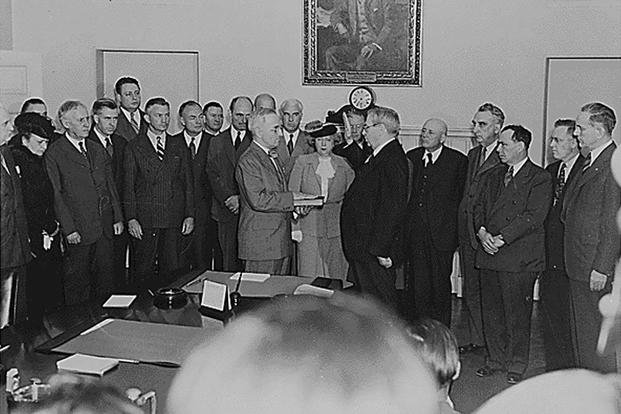When President Harry Truman took office after the death of Franklin Roosevelt, he was more than a little unprepared. He barely had any experience as vice president (a job he said was “as useful as cow’s fifth teat”), coming into the White House after a decade in the Senate.
Truman took over at a critical time during World War II but had been kept in the dark about the atomic bomb in development or about the looming Soviet threat. He had only been vice president for just shy of three months.
“I felt like the moon, the stars and all the planets had fallen on me,” he told reporters.

By 1945 when Truman took the oath, the office of the president was a very different office from the one Franklin Roosevelt had taken over in 1933. His successor resolved that no incoming president would ever again be introduced to the job the way he was.
It was not the first time Harry Truman had to be quick on his feet. He’d been the underdog for most of his life. He had to memorize an eye chart to pass the Army physical to fight in World War I. He had to scare his troops into combat using a surprising string of curses. Before becoming a politician, he went through a number of careers, including miner, farmer and judge.
Truman’s term of office was so embroiled in controversy that he wasn’t even supposed to be able to win a presidential election on his own. But in 1948 he did just that, with 303 electoral votes to Republican Thomas Dewey’s 189.
Read: 7 People Who Switched Careers and Changed the World
When the time came, Truman would decline a second elected term. Instead, for the election of 1952, he cleared the way for an epic political battle between the Democratic candidate Adlai Stevenson and war hero and Republican juggernaut Dwight D. Eisenhower.
This election would be different for the incoming candidates, however. Truman wasn’t about to let the potentially new president get thrown into the deep end like he was -- especially since the United States was fighting an ongoing military “police action” in Korea.
Ike, of course, was Supreme Allied Commander in Europe both during and after World War II, so he would likely have been prepared for the job. Stevenson worked in various posts under the Roosevelt Administration and at positions at the newly-formed United Nations, so he had his own bona fides.
But the office of president is all about precedents. Truman knew that regular intelligence briefings for the candidates would be extended to future candidates as well. So he offered them to both Stevenson and Eisenhower after they were officially nominated by their respective parties.
The briefings don’t really divulge classified information to the potential commander-in-chief. What they do is give each candidate a good run down of the ongoing, emerging and potential issues they may have to face as president. By the time they get into office, the theory goes, they are more than prepared to tackle the issues -- and get the classified information.
As Truman expected, the intelligence briefing system he set up has continued for successive candidates through the years, all the way through candidate Donald Trump.
-- Blake Stilwell can be reached at blake.stilwell@military.com. He can also be found on Twitter @blakestilwell or on Facebook.
Want to Learn More About Military Life?
Whether you're thinking of joining the military, looking for post-military careers or keeping up with military life and benefits, Military.com has you covered. Subscribe to Military.com to have military news, updates and resources delivered directly to your inbox.










